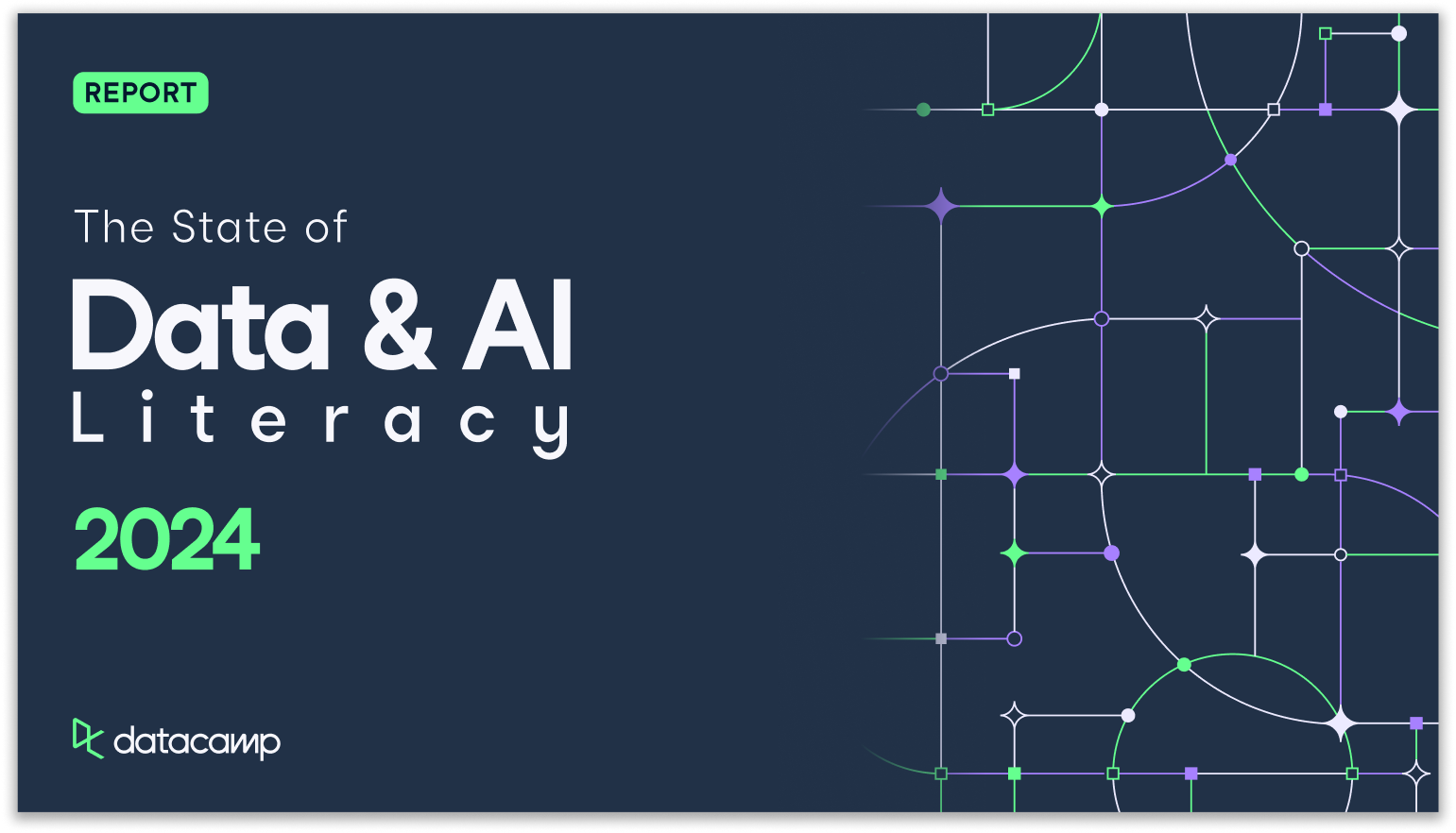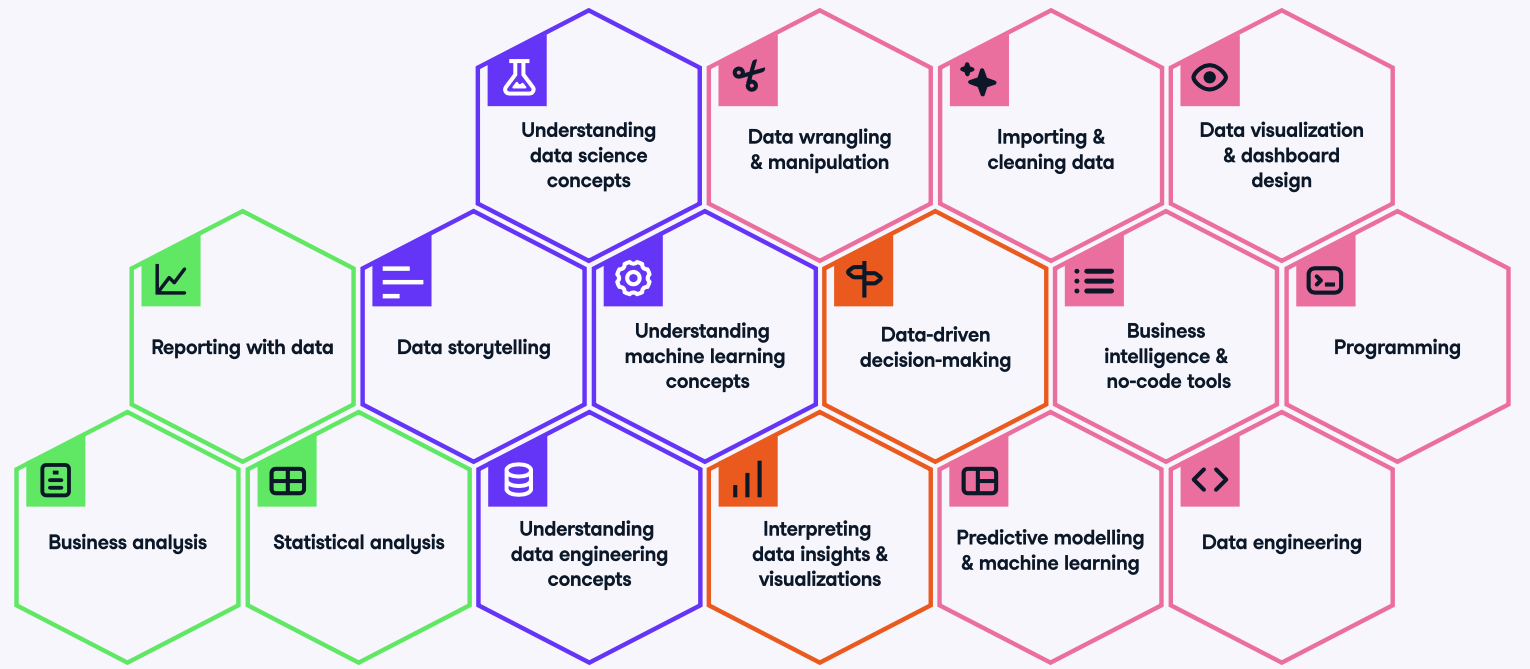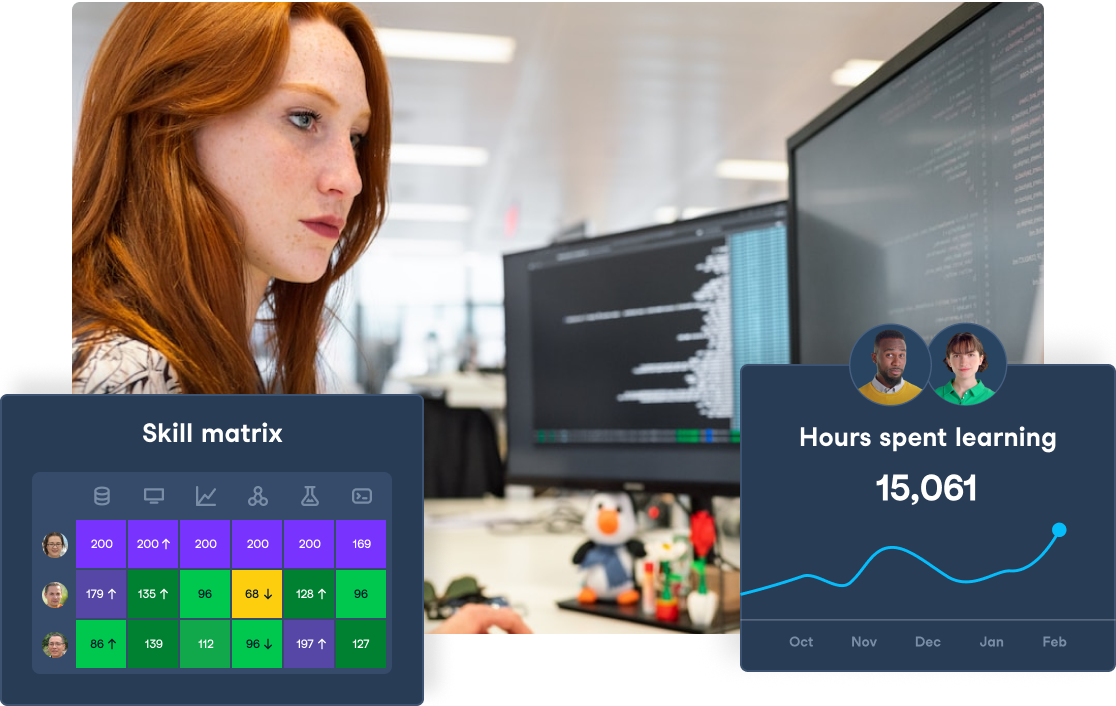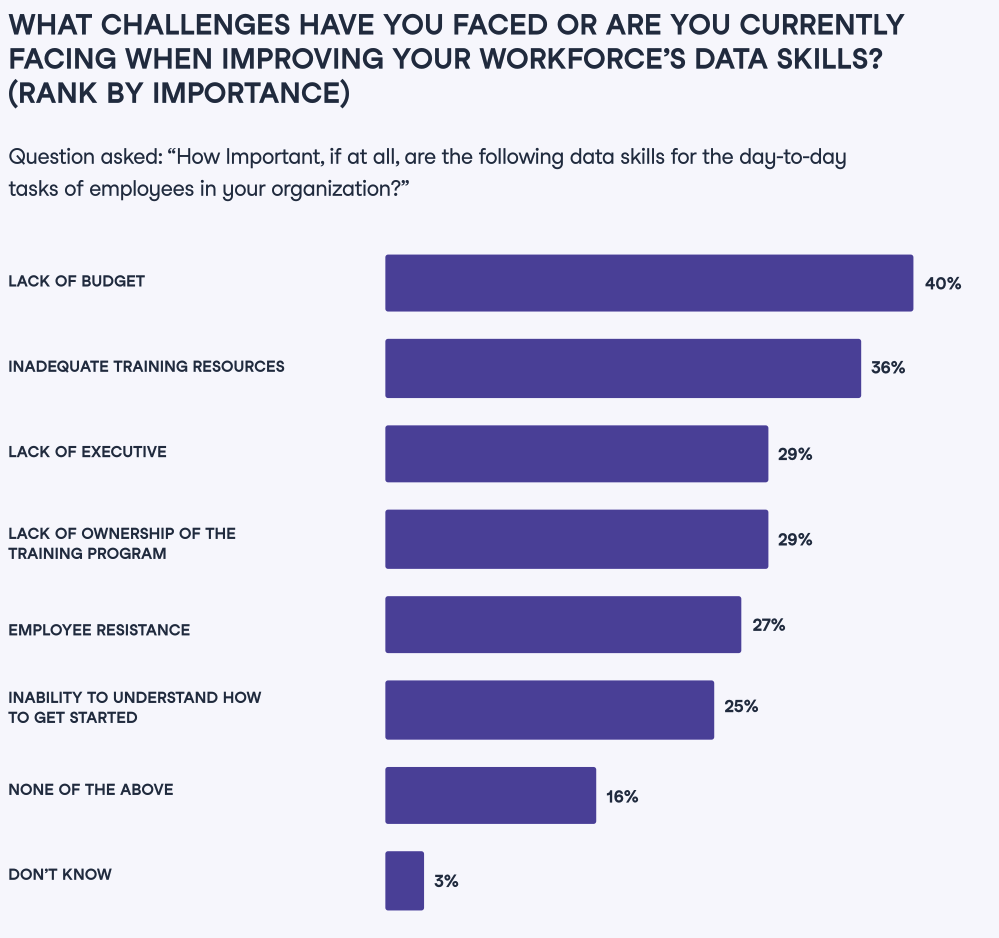Throughout the DataCamp State of Data Literacy Report, it was clear that data skills are in high demand and will continue to be for the foreseeable future. Organizations want data literate employees, and are willing to pay a premium for them.
However, despite this high demand, there is a discrepancy between the needs of businesses and organizations and the levels of data literacy and data skills training. What’s driving this gap? And how can we address it? This article explores these themes and more. Interested in the generative AI talent gap specifically? View our webinar, Bridging the Generative AI Talent Gap, to learn effective strategies for your organization.
Download the State of Data & AI Literacy Report 2024
Uncover what 550+ leaders in the US & UK believe about the state of their teams’ data & AI skills.

The High Demand for Data-Driven Decision Making
One of the key findings from the State of Data Literacy report is that, for industry leaders in the US and the UK, the most in-demand data skill is data-driven decision-making, with 78% of leaders highlighting it as essential. This preference is hardly surprising, considering that imprecise decision-making is deemed the main risk of inadequate data skills.
Other in-demand skills include the ability to interpret data visualizations and dashboards (74%), data analysis and manipulation (72%), and data storytelling or presenting data to different audiences (66%). These skills are indispensable as businesses aim to cultivate a workforce capable of making fast, precise decisions based on data.
The Need for Technical Proficiency
Apart from basic skills, leaders are also in search of more advanced, technical data skills. The ability to create dashboards and visualizations (66%) and knowledge of business intelligence tools such as Tableau and Power BI (65%) are highly coveted.
Competence in working with and creating databases using SQL (53%) and programming skills in Python and R (42%) are similarly sought after.
Machine learning (47%) and data engineering (52%) skills are prized by nearly half of the surveyed respondents.
This reveals an interesting trend: while not everyone may be required to build data pipelines or implement machine learning solutions, there's an increasing expectation for employees to be conversant in these areas.
Understanding the Spectrum of Data Literacy
Data literacy, or the ability to read, write, communicate, and reason with data, is a spectrum of skills that span from basic data-driven decision-making to advanced machine learning and data engineering.
This perspective of data literacy as a spectrum is confirmed by Jordan Morrow, who claims, “A holistic data strategy ties to the business objectives and gives the data and analytical work a direction to follow."
In this perspective, data skills permeate through the entire organization, starting from someone who merely knows how to read data and ask questions to the most advanced technical person.
This assertation means that data literacy is not a one-size-fits-all solution; it must be tailored to fit the varying levels of competence within an organization.

The Current State of Data Training
While the value of data literacy is recognized, the state of data training within organizations presents room for improvement.
When leaders were questioned about the status of data training in their organizations, 79% affirmed that they offer some form of data training. However, this figure doesn't tell the entire story. About 34% of leaders mentioned that only employees in specific data roles receive data training, while just 14% stated that only employees outside data roles are trained.
The data suggests that comprehensive data upskilling, encompassing everyone within the organization, has yet to become a priority for most enterprises today. Even the methodology of delivering training is varied, with responses ranging from third-party online-based training providers (23%) to internally created online training (20%), and from internal instructor-led sessions (10%) to a combination of online and instructor-led training (29%).
So despite the clear need for data skills training, few organizations offer a comprehensive solution. And it’s not just in the workplace. A 2021 report by Forrester, it was found that while data literacy was the most in-demand skill for entry-level positions, a mere 48% of academic institutions had implemented data literacy skills initiatives.
As we explore in a separate article on the future of data literacy, these skills can help address some of the global challenges we’re likely to face over the coming years.
Empower Your Team with Data Literacy
Enhance your team's data literacy and decision-making capabilities with DataCamp for Business. Access diverse courses, hands-on projects, and centralized insights for teams of 2 or more.

What’s Driving the Data Skills Gap?
Before delving into the challenges behind the data skills gap, it's crucial to understand what this gap comprises. The gap reflects the discrepancy between the data skills that companies demand and the current proficiency level of their employees.
This gap is not merely an educational issue but is driven by a confluence of factors including budget constraints, training resources, organizational culture, and employee resistance, among others.

Budget Constraints
First and foremost, financial limitations play a significant role in the data skills gap. About 40% of leaders mentioned that a lack of budget is one of the biggest obstacles when improving their workforce’s data skills. Without sufficient funds, organizations struggle to invest in comprehensive training programs, thereby impeding employees' ability to upskill and grow.
Inadequate Training Resources
Another crucial driver of the data skills gap is the lack of adequate training resources, as cited by 36% of leaders. The absence of effective, up-to-date, and accessible training materials and platforms makes it challenging to teach data skills effectively. Consequently, this exacerbates the disparity between the existing skills of employees and the skills needed by organizations.
Organizational Culture and Leadership Support
Approximately 29% of leaders mentioned the lack of executive support and ownership of the training program as critical challenges. This points towards the essential role of organizational culture and leadership in driving data literacy.
Unless executives are invested in promoting data literacy and are willing to sponsor comprehensive training programs, organizations will face significant difficulties in closing the data skills gap.
Employee Resistance
Lastly, about 27% of leaders indicated that employee resistance poses a challenge to improving data skills. This could stem from various factors, including fear of change, lack of motivation, or the belief that data skills might not be relevant to their roles. Therefore, fostering an organizational data culture that encourages continuous learning and highlights the importance of data literacy is crucial in addressing this challenge.
The Path to Closing the Data Skills Gap
Addressing these challenges requires a strategic approach that not only considers budgetary and resource allocations but also focuses on cultivating a supportive organizational culture.
Data culture and skills are a big part of a successful data strategy... the upskilling and data literacy program is definitely something that you want to do early as part of your data strategy, to be able to deliver value down the line.
Vijay Yadav, Director of Quantitative Sciences & Head of Data Science at the Center for Mathematical Sciences at Merck
In other words, closing the data skills gap is not just about offering more training or allocating more resources; it's about shifting mindsets and placing people at the center of data transformation. You can read more about closing the data literacy gap in a separate article.
Final Thoughts
The challenge of bridging the data literacy skills gap is an intricate one, encompassing not only the need for expanded data training and education but also the cultivation of a data-driven organizational culture. This article has explored the crucial role of technical proficiency, the spectrum of data literacy, the current state of data training, and several factors that widen this skills gap, including budget constraints, lack of training resources, organizational culture, and employee resistance.
As the insights from industry leaders reveal, addressing these challenges requires a holistic approach. More than just investing in training or resources, closing the gap necessitates a shift in mindsets and the embedding of data literacy at the heart of organizational strategy and culture.
This journey may not be easy, but in a world increasingly powered by data, it's one that businesses cannot afford to ignore.
By placing people at the center of data transformation, organizations can empower their workforce, unlock the full potential of their data assets, and chart a course towards a more data-literate future.
Training 2 or more people? Check out our Business solutions
Get your team access to the full DataCamp library, with centralized reporting, assignments, projects and more


A senior editor in the AI and edtech space. Committed to exploring data and AI trends.



